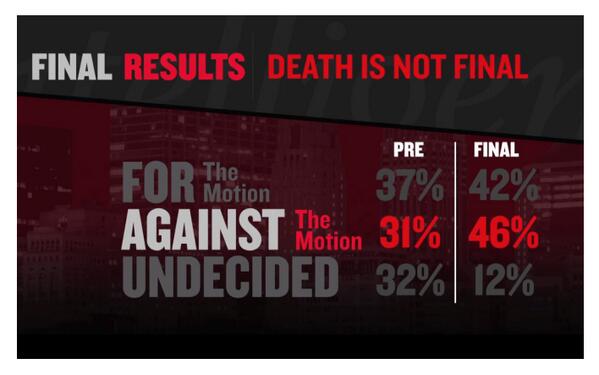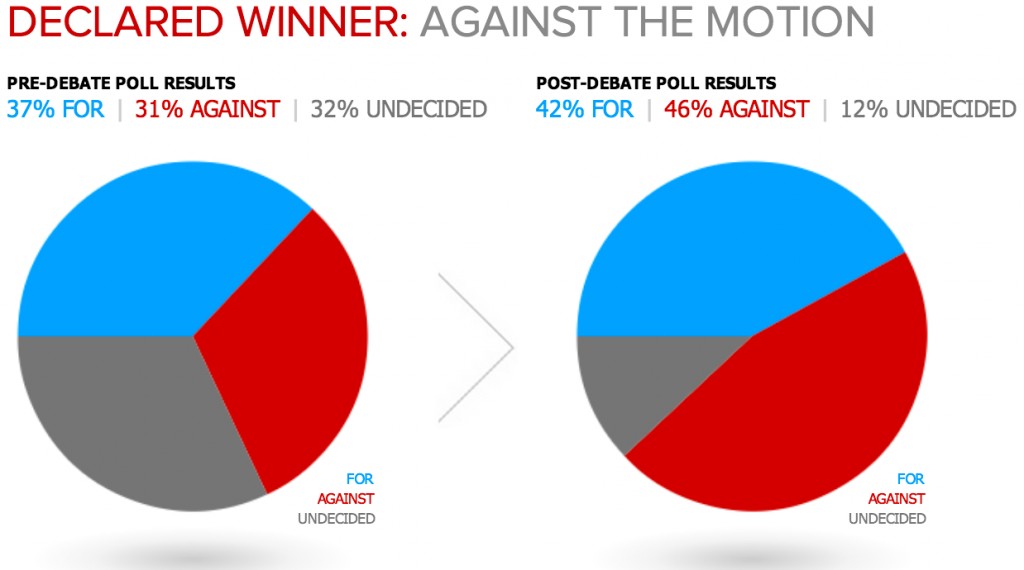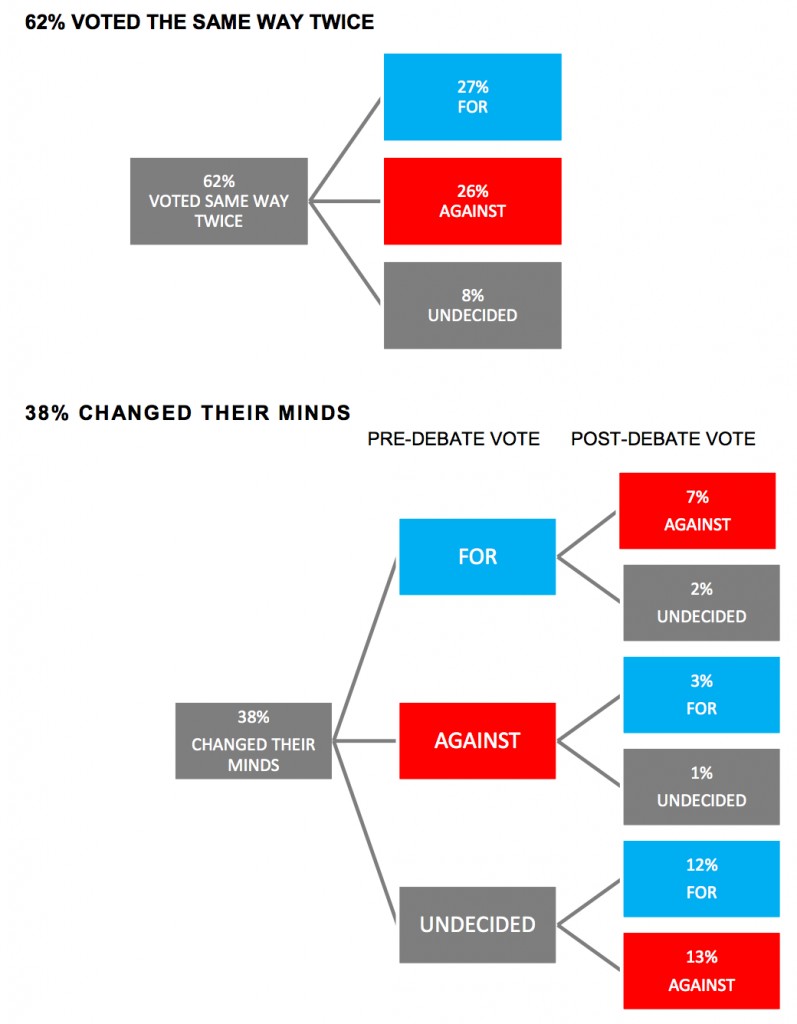Video from Wednesday’s debate over “Death Is Not Final” is now up.
You’ll be happy to hear that the good guys “won.” In scare quotes because helping the world’s population understand that naturalism is the right way to view the universe is a long-term project that won’t be settled with a single debate. But Intelligence Squared does a fun thing where they ask people to vote before the debate starts, and then again afterward. We started out the night slightly behind in the polls, and by the time we were done we were slightly ahead. Mostly by peeling away the undecideds, as any savvy politician strives to do. [Update: oops, not right. See below.] So that counts as a victory — especially when the topic is one where many people (not all!) have fairly fixed opinions.
It was a pleasure to have Steve Novella as a partner. The man knows his neuroscience, as well as his debating. He did a great job making the single most important point for an issue like this: the mind is the brain, full stop. It’s hard to hear the case he makes and hold on to any contrary view.
I was slightly disappointed in the folks on the other side. Eben Alexander basically relied on two things. One was his personal story of having a Near-Death Experience while in a coma. Anyone who accepts that people can experience dreams or hallucinations will not be overly persuaded by that alone. The other was to throw up ideas like “quantum mechanics” and “the hard problem of consciousness” in an obfuscatory way, to give people license to believe that science doesn’t understand everything. Which is true! Science doesn’t understand everything. Which doesn’t change the fact that no serious researcher in quantum mechanics or the hard problem thinks that those ideas provide an excuse for believing in life after death.
Ray Moody was a very pleasant gentleman, someone you’d be happy to have a beer with and talk philosophy. But he did almost nothing to defend the proposition. I was expecting him to broaden the evidence from Alexander’s own case to many others, but instead he spoke in generalities about science and philosophy and logic, concluding essentially that it’s “conceivable” that a realm exists where souls can persist after death. Indeed it is. Many things are conceivable.
At the end of my opening talk I said that the choice here basically comes down to two options we can believe:
- Everything we think we understand about the behavior of matter and energy is wrong, in a way that has somehow escaped notice in every experiment ever done in the history of science. Instead, there are unknown mechanisms allow information in the brain to survive in the form of a blob of spirit energy, which can then go start talking to other blobs of spirit energy, but only after death, except sometimes even before death.
- Physics is right. And people under stress sometimes have experiences that seem real but aren’t.
In the light of the evidence, the choice is pretty clear. We’ll get there, a couple of percentage points at a time.
Update: I was too hasty in presuming that most of our increase came from swaying undecided voters. Here are the actual data:
As you can see, the undecideds actually broke almost equally for the two sides. Our glorious victory actually came from a combination of factors, including persuading some of the “For” voters to switch.



“Mind is the brain.” But also the body. Consciousness and “mind” are an effect of having a brain in a body with senses, of which sight and hearing (or touch if one is deaf and blind like Helen Keller) are imperative. In what sense would one be conscious, much less have a mind, if a brain could exist outside the body and never existed in a body with senses?
The debate reminded me why I have such a tough time with the “many-worlds” interpretation: Having fewer equations is, I suppose, aesthetically appealing, but wouldn’t that view entail that there is an alternate history branch in which you (or I) live “forever”? Or, where you (or I) endure to the heat death of the universe? In other words, as I understand it, non-zero probabilities, however infinitesimal, would be represented on some branch of alternate history. Don’t much care for the idea of immortality. I hope someone can explain to me how that’s somehow phase-cancelled away in all possible worlds. Otherwise, I’m going to be very upset on behalf of the “me” in the branch of the multiverse who has to endure another 5 billion years of consciousness.
A little googling and apparently my flip comments were, in fact, Everett’s view: “Atheist or not, Everett firmly believed that his many-worlds theory guaranteed him immortality: His consciousness, he argued, is bound at each branching to follow whatever path does not lead to death —and so on ad infinitum.”
Again, I understand the appeal of MWI: whee! less equations!! respect the wavefunction! But, if it leads here, I suspect this shit is just silly.
See also ‘Quantum Russian Roulette’.